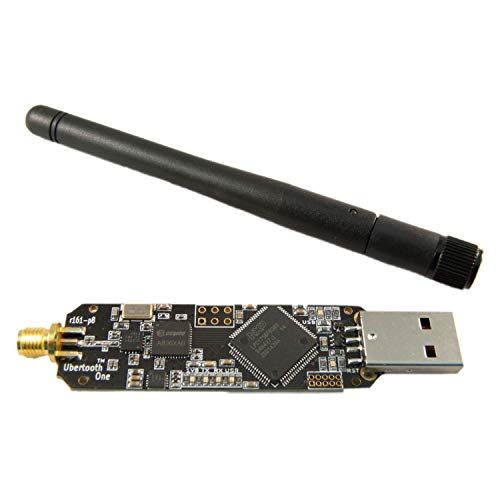
Ubertooth One Great Scott Gadgets - Bluetooth module
📦 Same-day dispatch? Order within:

📦 Same-day dispatch? Order within:
• RP-SMA RF connector: connects to test equipment, antenna or dummy load.
• CC2591 RF module.
• CC2400 wireless transceiver.
• LPC175x ARM Cortex-M3 microcontroller with Full-Speed USB 2.0.
• USB A plug: Connects to a host computer running Kismet or other host software.
• 2.4 GHz transmission and reception.
• Send and receive a sensitivity comparable to a class 1 Bluetooth device.
• Standard Cortex debugging connector (10 pin 50 mil JTAG).
• Serial System Programming (ISP) interface.
• Expansion connector: designed for communication between Ubertooth or other future applications.
• Six LED indicators.
The diagram below shows the location of the LEDs and pins of the expansion connector:

• RST: Indicates that LPC175x is turned on. This should always be enabled during operation, except for a full LPC175x reset (eg when entering ISP mode).
• 1V8: Indicates that the CC2400 has 1.8 volts. This power is controlled by firmware. 1V8 power is required to activate the crystal oscillator which is required to activate the USB.
• USB: Indicates USB has passed enumeration and configuration.
• TX: Control of this LED is firmware dependent. Usually means radio transmission.
• RX: Control of this LED is firmware dependent. Usually means radio reception.
• USR: The control of this LED is firmware dependent.
The TX, RX and USR LEDs flash in a characteristic pattern when the bootloader is ready to accept USB DFU commands.
These measurements were made using Ubertooth One with firmware version 2014-02-R2. Zero_Chaos made these measurements with the Centech CT-USB-PW available on eBay and others.
Command |
Description |
Power draw (amps) |
Idle |
0.09A |
|
| ubertooth-dump |
Receive |
0.13A |
ubertooth-util -t |
Transmit |
0.22A |
| ubertooth-dfu --write |
Firmware upgrade |
0.10A |
Demonstration:
Michael Ossmann presented Project Ubertooth: Building a Better Bluetooth Adapter at ShmooCon 2011.